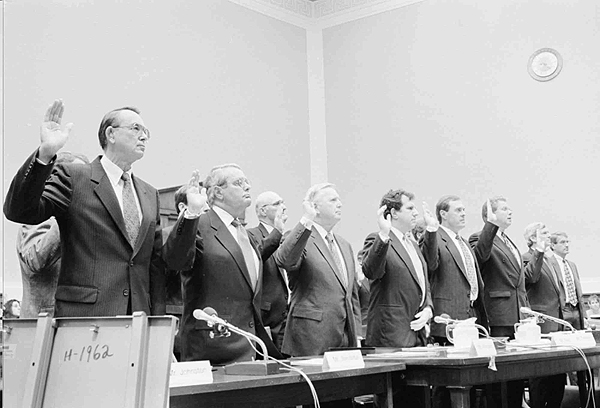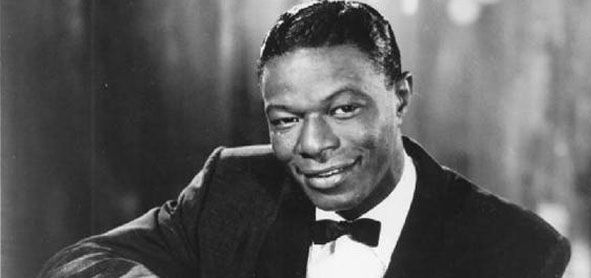
Tobacco industry executives denying the link between tobacco and cancer at congressional hearing in 1994.
When I finished reading a new report from the American Lung Association, Too Many Cases, Too Many Deaths: Lung Cancer in African Americans, all I could do is shake my head. It hit home for me. I know the damage caused by smoking, having been 12-years old when my father, only 48-years old, succumbed to cancer. I hate cigarettes and over the years have used every opportunity to spread the news of how this dangerous product destroys individuals and brings anguish to families. What disturbed me when reading this report is that forty-seven years after my father’s death, smoking and lung cancer still has a death grip on the African-American community.
As painful as it was to lose my father, in retrospect it is clear that in 1971 our understanding of the dangers of smoking was deficient. Though cigarette packaging had by that time carried a warning on the possible dangers of smoking, our cultural sensitivities had not caught up with the emerging facts. Smoking was still glorified in movies, on television and magazine advertising during the 1950s through late 1960s. Ironically, the year my father died was the year in which the Public Health Smoking Act banned the advertising of cigarettes on television and radio. There was also a certain masculinity associated with smoking though by the 1970s’ tobacco companies were targeting women as an emerging market. For men, smoking was almost a right-of-passage for my father’s generation. Enlisted men, like my dad, a World War II veteran, were welcomed into the armed forces with a carton of cigarettes. It was an era when smoking was part of the nation’s social fabric. So much so that even candy cigarettes were a popular item in confectionary shops. I regretfully recall the many trips I made to the corner store to purchase a pack of unfiltered Pall Mall cigarettes for my dad and candy cigarettes for me, and anxious for the day that I could smoke.
It is why the persistence of lung cancer is so frightening today. With all that we now know, the public disclosures of the ethical failures of the tobacco industry and the prohibitions now in place against smoking in public settings, and lung cancer is still decimating the African-American community.
 One would have thought by now we would have got the message on the dangers of smoking. After the tens of thousands of deaths of African-Americans due to lung cancer and seeing celebrities such as Nat King Cole, Jesse Owens, Duke Ellington and Donna Summer succumb to the disease, there is an appalling lack of urgency in the African-American community to change behaviors. The American Lung Association notes in its new report that African-Americans have a higher death rate from lung cancer than any other racial or ethnic group in the United States. Black men are 37 percent more likely than white men to develop lung cancer. What makes this all the more appalling is that lung cancer is a preventable disease. We are it seems, in many instances, simply killing ourselves.
One would have thought by now we would have got the message on the dangers of smoking. After the tens of thousands of deaths of African-Americans due to lung cancer and seeing celebrities such as Nat King Cole, Jesse Owens, Duke Ellington and Donna Summer succumb to the disease, there is an appalling lack of urgency in the African-American community to change behaviors. The American Lung Association notes in its new report that African-Americans have a higher death rate from lung cancer than any other racial or ethnic group in the United States. Black men are 37 percent more likely than white men to develop lung cancer. What makes this all the more appalling is that lung cancer is a preventable disease. We are it seems, in many instances, simply killing ourselves.
The story, of course, is much more complicated. A number of factors are driving the horrible rates of lung cancer deaths of African-Americans. Not the least is the dearth of African-American physicians. Having a doctor that looks like you and is culturally competent matters when you are faced with a medical diagnosis that is life threatening. Blacks comprise just 4 percent of all physicians in the United States. So, the likelihood of having an African-American primary care physician is slim to none. This is not to suggest that white doctors are unable or unwilling to provide proper care of Black patients. There is, unfortunately, a history of mistrust of heath care professionals by African-Americans that is rooted in a history of discriminatory practices in the medical profession. My father, a child of Jim Crow in his native Virginia, did not visit a doctor from the time of his discharge from the Army after World War II until 1971 when he began to feel ill. Trusting in your medical provider and establishing a real provider-patient partnership can go a long way to having the confidence and will to confront an unfavorable diagnosis. Sadly, many African-Americans lack access to a primary care physician, do not have health care insurance, and rely on emergency room care so when they do receive a diagnosis such as lung cancer, they may be beyond the point where treatment can be effective.
Like diabetes, HIV/AIDS, and high blood pressure, lung cancer is a disease that African-Americans can conquer. We do not have to be victims. When I see Black teenagers and young adults smoke I always encourage them to seek help to stop smoking. Research suggests that Blacks do not take advantage of cessation programs and that could be partly attributable to our lack of confidence in the health care system. It is also attributable to a tragic denial of the scientific research that connects smoking to cancer. Many of us simply do not believe it to be true. That’s a real mistake. There are certain causes of lung cancer that are not easily controlled, such as exposure to second-hand smoke, pollutants in the air and radon, but smoking is within the smoker’s power to stop – albeit recognizing the addictive power of cigarettes.
Given the impact on Black men and our families, we need to make confronting lung cancer a priority. When you think of all the things that jeopardize Black life in America, the threats we can control should be of paramount urgency.
Walter Fields is Executive Editor of NorthStarNews.com.












